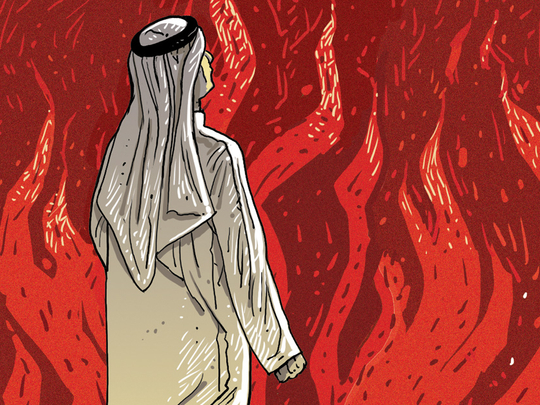
Eighty eight Saudi citizens were arrested last week on suspicion of conspiring against the state and planning to kill and kidnap. They are all allegedly members of Al Qaida. And these are not the first people to be arrested. In addition, 130 names were published worldwide of supporters and financiers of the Islamic State of Iraq and the Levant (Isil). And 35 of these come from GCC countries.
The United Nations Security Council adopted resolution 1270, under Chapter 7, branding Isil and the Al Nusra Front as terrorist groups. It named some Gulf citizens as collaborators with Isil, which is killing minorities in northern Iraq. It recently beheaded two American journalists and has threatened to kill a British hostage. All these people happened to be in the wrong place at the wrong time.
Add to this the bloody, sectarian fighting in Syria and neighbouring Lebanon and the war clouds gathering in Yemen, and we can see clearly that the GCC finds itself in a very dangerous neighbourhood. So, what should the GCC do collectively to safeguard its people from these tragic events?
It looks like very little has been done so far. News from Gulf foreign ministers’ meetings coming to us is conflicting for us ordinary Gulfies. So we are puzzled by the apparent differences between some Gulf states. A good number of Gulf commentators and writers, including myself, are reluctant to write on this sensitive issue, not because of the lack of information, but because of the hopes one had that these war clouds would soon be gone.
Political tsunami
But that doesn’t seem to have happened yet despite diplomatic efforts invested so far. The chilling fact — that the Middle East region is faced with a political tsunami — is quite visible to everyone, including Gulf citizens.
In the region, there is a situation where the sectarian fighting in Iraq has claimed more than 1,500 lives a month on average over the past 10 years, where the civil war in Syria has claimed 200,000 victims and has turned millions into refugees, where there is outbreak of fighting in Yemen and where Egypt has still not fully stabilised.
What we see in the region is the states are fighting two evils — poverty and terrorism. The threat from non-state actors is present almost everywhere in the region, from Libya to Yemen.
At this time, Gulf states need to focus all their energy to face these threats and differences between them affect their diplomacy, leaving the door open to regional and international powers to interfere. What makes things worse is that sometimes the differences in opinion are not kept at the official level but get talked about in some sections of the media, and also social media, thus inflaming the whole situation and making it harder to solve.
This situation may weaken the resolve of the GCC, which is almost the only part of the Arab world so far that has not been affected by the tsunami engulfing the region. I do believe firmly that most Gulf citizens, wherever they are, are looking to the whole episode with sadness. Our social fabric is almost the same, their common interest is almost the same and external and internal threats are affecting everybody in the whole Middle East.
The sooner the GCC irons out all issues, the better for everyone as time is a luxury the region does not have. The big powers are busy with other issues too, like the Ukraine crisis, apart from the general economic crisis. There are no regional powers the Gulf can rely upon as these are either busy with their own internal problems or will demand a heavy price to help. The only path for the GCC is to come together and pay what is needed to do so. The old generation of Gulf leaders — like the late Shaikh Zayed Bin Sultan Al Nahyan, King Fahd Bin Abdul Aziz, Shaikh Jaber Al Ahmad Al Sabah — in 1981 realised the threat for everyone posed by the Iran-Iraq war. They came together with the idea of the GCC, which has since proved to be one of the great ideas of our times.
Today, the threat to the region is even greater than the one that existed in 1981. It is threatening not just the stability of the region but the wellbeing of the people.
Mohammad AlRumaihi is a professor of political sociology at Kuwait University. You can follow him on Twitter at www.twitter.com/@rumaihi42









